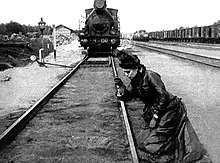Maria Germanova
Maria Germanova | |
|---|---|
Imperial Russia | |
| Died | 9 April 1940 (aged 55–56) |
| Occupation(s) | actress, theatre director, memoirist |
| Spouse | Alexander Kalitinsky (1879–1946) |
Maria Nikolayevna Krasovskaya-Kalitinskaya (Russian: Мария Николаевна Красовская-Калитинская, née Bychkova (Бычкова), 1884 – 9 April 1940) was a Russian actress, theatre director and reader in drama, better known under her stage name Maria Germanova (Германова).[1]
Biography
Maria Bychkova was born in Moscow into a family of the staroobryadtsy merchants. She studied at the First Moscow Gymnasium, where Olga Gzovskaya was one of her classmates. In 1901 she enrolled in the just opened Moscow Art Theatre Drama School and a year later joined the MAT troupe, as Maria Germanova.
She debuted in 1903 in

In 1914–1924 Germanova starred in five Russian silent films, starting with Anna Karenina in 1914, directed by Vladimir Gardin and produced by Paul Timan.
In 1919 Germanova left Moscow, first for
In 1922, along with several of her colleagues Germanova refused to return to Moscow. In 1923 Nemirovich-Danchenko sent her a telegram inviting her to take part in his new musical theatre project, but this offer was declined. Instead, Germanova arrived at Prague where her husband, the archeologist and art historian Alexander Kalitinsky has been lecturing at the Archeology Institute (which he in 1925 became the director of)[2] and soon, along with Nikolai Massalitinov, co-founded and became the director of what soon came to be known as the Prague MAT Troupe. Her repertoire now included also the parts of Ranevskaya (Chekhov's The Cherry Orchard), the Queen (The King of the Dark Chamber by Rabindranath Tagore), Ellida Wangel (The Lady from the Sea by Ibsen), Katerina (The Storm by Alexander Ostrovsky) and Medea by Euripides.[1]
After the Prague Troupe disbanded in 1927, Germanova took part in the productions staged by the
Selected parts gallery
-
1907:Marina Mnishek, Boris Godunov
-
1908: The Fairy, The Blue Bird
-
1909: Rosa, Leonid Andreyev's Anathema
-
1910: Grushenka,The Karamazov Brothers
-
1926: Medea
References
- ^ a b c d Мария Николаевна Германова. Profile at mxat.ru, the Moscow Art Theatre site
- ^ Н. Е. Андреев. Пражские годы // Новый Мир. 1994. № 11.]
- ^ Германова М.Н. Мой ларец с драгоценностями: Воспоминания. Дневники. Мария Германова; [сост., вступ. ст., подгот. текстов и примеч. И.Л.Корчевниковой; прилож.; оформл. О.Комаровой.] Русский путь 2012





